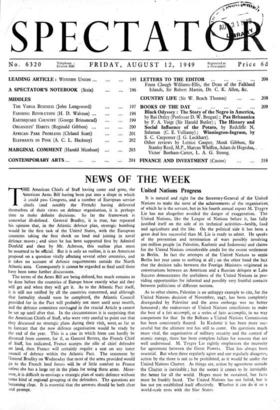United Nations Progress
It is natural and right for the Secretary-General of the United Nations to make the most of the achievements of the organisation. of which he is the servant, but in his fourth annual report M. Trygve Lie has not altogether avoided the danger of exaggeration. The United Nations, like the League of Nations before it, has fully justified itself on the side of its technical activities—health, food and agriculture and the like. On the political side it has been a great deal less successful than M. Lie is ready to admit. He speaks of the prevention and termination of wars possibly involving soo million people (in Palestine, Kashmir and Indonesia) and claims for the United Nations considerable credit for the recent settlement in Berlin. In fact the attempts of the United Nations to settle Berlin last year came to nothing at all ; on the other hand the fact that the decisive talks between the Foreign Ministers originated in conversations between an American and a Russian delegate at Lake Success demonstrates the usefulness of the United Nations in pro- viding opportunities for informal and possibly very fruitful contacts between politicians of different nations.
As to other claims, Palestine is an unhappy example to cite, for the United Nations decision of November, 1947, has been completely disregarded by Palestine and the arms embargo was no better honoured ; the endeavours of United Nations conciliators to make the best of a fait accompli, or a series of faits accomplis, in no way compensate for that. In the Balkans a United Nations Commission has been consistently flouted. In Kashmir it has been more suc- cessful but the ultimate test has still to come. On questions much more vital, the organisation of military security and the control of atomic energy, there has been complete failure for reasons that are well understood. M. Trygve Lie rightly emphasises the necessity for agreement between the Great Powers. That has always been essential. But when three regularly agree and one regularly disagrees, action by the three is not to be prohibited, as it would be under the United Nations Charter. As things are, action by agreement outside thc Charter is inevitable ; but thc Kamer it ceases to be inevitable the better for all the world. Hopes must be sustained, but facts must be frankly faced. The United Nations has not failed, but it has not yet established itself effectively. Whether it can do it on a world-scale rests with the Slav States.






























